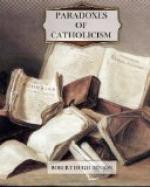Yet the general contention is plain enough—that on the whole the Catholic is bound to believe a certain set of dogmas, while the Protestant is free to accept or reject them. Therefore, it is argued, the Protestant is “free” and the Catholic is not. And this brings us straight to the consideration of the relations between Authority and Liberty.
II. What, then, is Religious Liberty? It is necessary to begin by forming some idea as to what it is that is meant by the word in other than religious matters.
Very briefly it may be said that an individual enjoys social liberty when he is able to obey and to use the laws and powers of his true nature, and that a community enjoys it when all its members are able to do so without interfering unduly one with the other. The more complete is this ability, the more perfect is Liberty.
A remarkable paradox at once presents itself—that Liberty can only be secured by Laws. Where there are no laws, or too few, to secure it, slavery immediately appears, no less surely than when there are too many; for the stronger individuals are, by the absence of law, enabled to tyrannize over the weaker. Even the vast and complex legislation of our own days is designed to increase and not to fetter liberty, and its greater complexity is necessitated by the greater complexity and the more numerous interrelationships of modern society. Laws, of course, may be unwise or excessively minute or deliberately enslaving; yet this does not affect the point that for all that Laws are necessary to the preservation of Liberty. Merchants, women and children, and citizens generally, can only enjoy rightful liberty if they are protected by laws. Only that man is free, then, who is most carefully guarded.
In the same manner Scientific Liberty does not consist in the absence of knowledge, or of scientific dogmas, but in their presence. We are surrounded by innumerable facts of nature, and that man is free who is fully aware of those which affect his own life. It is true, for example, that two and two make four, and that heavy bodies tend to fall towards the centre of the earth; and it can only be a very superficial thinker who considers that to be ignorant of these facts is to be free from the enslaving dogmas of them. If I am ignorant of them I am, of course, in a sense at liberty to believe that two and two make five, and to jump off the roof of my house; yet this is not Liberty at all in the sense in which reasonable people use the word, since my knowledge of the laws enables me to be effective and, in fact, to survive in the midst of a world where they happen to be true. That man, then, is more truly “free” whose intellect is informed of and submits to these laws, than is the man whose intellect is unaware of them. Marconi’s intellect submits to the laws of lightning and he is thereby enabled to avail himself of them. Ajax is unaware of them and is accordingly destroyed by their action.




